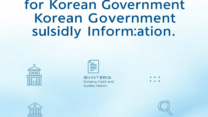
2025 US Government Export Grants: Key Support Programs for Businesses
Comprehensive Export Support for SMEs in the U.S.

Small and medium-sized enterprises (SMEs) are the backbone of the U.S. economy, and when it comes to expanding into international markets, the U.S. government offers a variety of export grants and support programs to help them succeed. These programs are designed to reduce financial risk, provide market insights, and connect businesses with global opportunities.
One of the most impactful programs is the State Trade Expansion Program (STEP), administered by the U.S. Small Business Administration (SBA). STEP provides financial awards to state governments, which in turn offer grants to eligible small businesses for activities such as participating in trade shows, developing international marketing materials, and accessing foreign markets. This can significantly reduce the cost burden for SMEs aiming to go global.
Another key resource is the U.S. Commercial Service, part of the International Trade Administration (ITA). They offer expert counseling, market intelligence, and business matchmaking services in over 75 countries. Their Gold Key Matching Service, for example, helps U.S. businesses find pre-screened potential partners overseas, saving time and improving the chances of successful market entry.
Additionally, the Export-Import Bank of the United States (EXIM) provides export credit insurance and working capital guarantees, which protect businesses against non-payment and help them secure financing. This is especially valuable for SMEs that may not have access to traditional credit lines.
For those just starting their export journey, the SBA’s Export Business Planner is a free, interactive tool that helps businesses create a customized export strategy. It covers everything from market research to logistics planning.
These government-backed programs are not only designed to support SMEs financially but also to equip them with the knowledge and tools needed to thrive in global markets. By leveraging these resources, small businesses can confidently expand their reach and grow sustainably.
For more information, you can visit the official SBA export assistance page: https://www.sba.gov/exporting
Flexible Export Voucher Program for Targeted Growth

For small and medium-sized enterprises (SMEs) in the United States looking to expand internationally, the Flexible Export Voucher Program offers a valuable opportunity to offset the costs of global market entry. This program, administered by various state-level export assistance centers and supported by the U.S. Small Business Administration (SBA), provides financial assistance to eligible businesses to cover export-related expenses.
What makes this program especially helpful is its flexibility. Unlike rigid grant structures, the voucher can be used for a wide range of export activities, including participation in international trade shows, translation of marketing materials, export training, and compliance testing for foreign markets. This means that businesses can tailor the use of funds to meet their specific growth strategies.
To qualify, businesses typically must be U.S.-based, meet SBA size standards, and demonstrate a viable export plan. Many states have their own application processes, so it’s important to check with your local export assistance center or economic development agency. For example, the State Trade Expansion Program (STEP), funded in part by the SBA, often incorporates export vouchers as part of its support tools.
By reducing the financial burden of entering new markets, the Flexible Export Voucher Program empowers American SMEs to compete globally, create jobs, and diversify their revenue streams. It’s a practical, accessible resource for businesses ready to grow beyond U.S. borders.
For more information, you can visit the official SBA STEP Program page: https://www.sba.gov/funding-programs/grants/state-trade-expansion-program-step
Expansion Assistance for Mid-Sized Enterprises

Mid-sized businesses in the U.S. often find themselves in a unique position—too large for many small business programs, yet not quite big enough to compete globally without support. Fortunately, the U.S. government recognizes this gap and offers targeted export grants and assistance programs specifically designed to help mid-sized enterprises expand into international markets.
One of the most valuable resources is the U.S. Commercial Service’s International Trade Administration (ITA), which provides the Market Development Cooperator Program (MDCP). This program offers financial and technical assistance to help mid-sized companies enter new markets, increase exports, and create jobs. MDCP partners with non-profit industry groups and trade associations to help businesses overcome trade barriers and gain access to foreign buyers.
Another essential program is the State Trade Expansion Program (STEP), administered by the U.S. Small Business Administration (SBA). While STEP is often associated with small businesses, many mid-sized firms also qualify. It provides grants to U.S. states and territories to support export development for eligible businesses, including funding for trade missions, international marketing campaigns, and export training.
Export-Import Bank of the United States (EXIM) also plays a crucial role by offering export credit insurance, working capital guarantees, and direct loans to help mid-sized exporters mitigate risks and secure international deals. These financial tools are especially useful for companies looking to expand without overextending their cash flow.
By leveraging these programs, mid-sized enterprises can reduce the financial and logistical challenges of going global. It’s a smart move for businesses ready to scale and compete internationally.
For more information, you can visit the official U.S. Commercial Service website: https://www.trade.gov/mdcp
Eco-Focused Export Grants for Green Industries

As the global demand for sustainable products and clean technologies continues to rise, the U.S. government is stepping up to support eco-conscious businesses through export grants specifically tailored for green industries. These grants not only help reduce the financial burden of entering international markets but also encourage innovation in renewable energy, sustainable agriculture, clean manufacturing, and environmental technology.
One of the key programs available is the U.S. Department of Commerce’s International Trade Administration (ITA) Green Export Initiative. This initiative provides technical assistance, market intelligence, and matchmaking services to help green businesses expand globally. Additionally, the U.S. Small Business Administration (SBA) offers the State Trade Expansion Program (STEP), which includes funding opportunities for small businesses in the green sector to participate in international trade shows, translation services, and e-commerce upgrades.
These grants are especially valuable for small and medium-sized enterprises (SMEs) that may lack the capital to explore foreign markets. By leveraging these programs, green businesses can increase their competitiveness, access new customers, and contribute to global sustainability goals.
For more information, you can visit the official STEP program page from the SBA: https://www.sba.gov/funding-programs/grants/state-trade-expansion-program-step
If you’re running a business focused on sustainability—whether it’s solar panel manufacturing, biodegradable packaging, or water purification technology—now is a great time to explore these federal resources. With the right support, your eco-friendly innovation can make a global impact.







